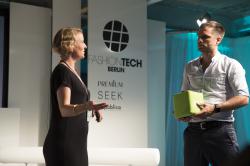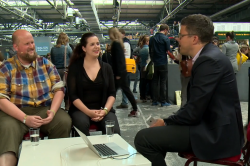presse_europavertieft_guerot2014cullerich006_zugeschnitten.jpg

Ulrike Guérot is a European publicist, and a fervent advocate of the European Republic. Transcending political parties and debates, she publishes essays and commentary on Europe and the question of European integration. Only recently, the political science researcher founded the European Democracy Lab, based at the European School of Governance in Berlin. The idea is to move away from the competition between nation states and Europe, and instead place the community of citizens at the heart of the European idea. She explains how the democracies of Europe might grow closer together, and why participation is not always the best way.
What is the European Democracy Lab?
I founded the European Democracy Lab together with Victoria Kupsch, who is – and this is important – from the “Erasmus” generation, so she is about half my age. We are concerned with generation dynamics issues within the European debate in particular: Who thinks what about Europe today? We have a new generation today that has quite different thoughts on Europe – young people who have already accepted the principle of the social and political equality of all European citizens, and are just waiting for Europe to correspond to that. Our main project at the moment is an interview series with MPs from six Euro countries about the future and the development of European democracy. Our report is due to be published in early 2016. [Editor's note: You can find the exclusive interim report at the bottom of this page.]
Despite this new generation with a positive attitude towards Europe, we are in a much-‐decried crisis. Why?
It is mostly overlooked that this is actually a systemic crisis, one which affects all Euro countries, not just Greece: Following the Maastricht Treaty of 1992 – the “ever closer Union”, the economy and democracy, the market and the state were decoupled, and now they have to be brought together again at the European level. One goal of our lab is to address and to highlight precisely this systemic crisis. One way of solving the crisis would be the creation of a transnational European democracy, based on the principle of equality of all European citizens, which is in fact incorporated in many European constitutions already. The European institutions would have to be further developed into a democracy that lives up to Montesquieu’s paradigm of the separation of powers.
What role could the Internet play in such a transnational European democracy?
The triangle “Europe – Democracy – Internet” is indeed a very difficult one, and hard to grasp. Although there is quite a lot of research being conducted, we do not yet know for sure how the Internet ultimately affects democracies: Will it allow populists better ways of organizing across national borders, or will it enable a European referendum for a whole continent? From Egypt and the Ukraine to Hong Kong, we have seen how the Internet allows for rapid political mobilization. But we have also seen that the Pirates have not been able to prime us all for “liquid democracy”.
But doesn’t the digital network foster participation, and therefore, democracy?
Participation is a problematic term. It is very “hip” to talk about it at present, and the European Commission has launched some extensive programmes (“Citizens Europe”) to promote participation and proximity of citizens in Europe. But their benefits are only very limited, and I believe that one reason for that is the fact that participation is merely a formal concept, which indeed misses its point when democracy degenerates into “post-democracy”, as described by Colin Crouch (“You can always vote, but you have no choice”). The latter point is exactly the problem in the EU – say when a government like in Greece is met with countless obstacles on its way to making a political turnaround, for which it has an actual mandate. The French thinker Pierre Rosanvallon once said: “We tend to think democracy means participation, but actually it is about the design of social bodies.” Digital networks are very important, but they are not the answer or the solution to the social question in Europe. So participation is not sufficient here, for the task of designing a socially and fiscally harmonized, politically unified framework for the Euro zone, and restructuring it as a political institution.
What are your associations with Finding Europe?
Finding Europe – yes, that is indeed the question today, or actually, has been since the Middle Ages. Which collective projections of democracy do we share, what are the cultural and historical conditions of democracy, where do they overlap? These questions should also extend to economic policy, since an economy is based in culture, and not just a matter of macroeconomic accounting.
This is something we need to communicate about in Euroland now, and find possible compromises. So for instance, it is not enough to flaunt the Germany socio-cultural model to other Euro countries – in this case, Finding Europe would mean, exploring the overlaps.
What kind of overlaps are you thinking of?
The political idea of the Republic is one of the core concepts of European intellectual history. Perhaps this could be utilized for the cultural junction of a revised democratic system in Europe. What are the strategic goods that we want in Europe, and which of those do we defend?
What is the “contrat social” – which social model, what kind of relationship between state and market do we choose for the Euro zone? These are burning questions now in post-Euro crisis Europe. And if we find some answers, we will have found a bit more of Europe... at least in the sense of the political and social equality of all inhabitants of the Euro zone. Europe is no longer about integrating nation states, but rather about uniting its citizens. Therefore, we are proposing to convert the concept of the United States of Europe into one of a European Republic.



